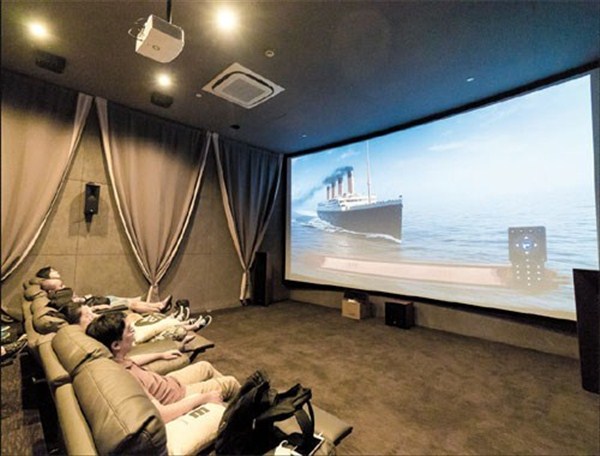
今日上海
私人影院走俏上海滩 - 2015年11月06日
Shanghai's private cinemas find cozy niche in film market

CHINA'S burgeoning movie market has been a boon for filmmakers and cinema chain operators. But behind the booming box-office results, private screening rooms are also quietly flourishing.
Based on online search results, there are now over 90 private cinemas and screening rooms operating around Shanghai. Most are small, with three to 12 rooms located in office buildings and residential areas. Frequenters to these venues are mostly young couples and friends who say they enjoy the comfort and privacy of such venues over public cinemas.
One such screening room listed on Dianping.com, an online lifestyle community, is Kimio Homo located in a residential apartment complex on Xujiahui Road.
"The place is tiny but clean, nice and very cozy. It's a good place for private gatherings like birthday parties or team building activities," wrote a Dianping user under the name of Yueyuyoutong.
While the address and contact information of Kimio Homo are listed online, some visitors still say it is a bit hard to find on their first visit. Despite that, operators say business has been good since the establishment opened in the summer.
"Making reservations through WeChat and Dianping.com is required," said a staff member at Kimio Homo who answered the business hotline.
The same building has another two private cinemas on its 4th and 8th floors. Visitors to these establishments also need to book screenings in advance.
"There are a lot more movies to choose from in private cinemas," Max Zhang, a 20-something IT worker and an occasional private screening-room visitor, told Shanghai Daily. "Compared with a major public cinema, my girlfriend and I can have a tailor-made, casual experience. We can change between movies and chat."
At Kimio Homo, couples can rent a room for as little as 100 yuan (US$15.77) for three hours. There is a 25 yuan charge for each additional guest. Other cinemas charge similar rates on weekdays, although fees tend to rise on weekends and holidays.
While many such cinemas can be found on social-media and listing websites, in the offline world they often keep low profiles. Most are also small, with screening rooms emphasizing intimacy and comfort. Some originally opened as private gaming rooms, but have recently diversified into the private-screening business.
According to local media reports, many cinemas offer a multitude of movies from China and abroad, with new films added regularly to their collections. Staff from Kimio Homo say guests can watch movies archived on Mi Box, an online screening platform.
Not everyone is thrilled though about these new establishments, some of which may be violating copyright laws and operating without the proper licences. Others have complained that these screening rooms can’t match conventional theaters when it comes to presentation quality.
Zheng Zhe, a newly-married engineer in his 30s, told Shanghai Daily that he visited a private theater in Jing’an District several times in the past. He believes such places are not ideal for those who want to appreciate the artistry of the cinema.
"It's an option for young people on dates or hosting parties," says Zheng. "At private theaters, you can never expect the best sound and the movies offered there are usually not the latest productions. I'd rather watch movies at home."
Zheng speculated that most movies shown in such cinemas are pirated. Once, he says, he watched a film with a digital watermark, a mark that film companies insert to signal improper distribution.
Zhu Ying, a local college student, says private cinemas seem interesting, but could be unsafe.
"I won't go to small, informal theaters in residential buildings," said Zhu. "The facilities at informal cinemas operating out of apartments could be poor. And I would know nothing about other customers."
Others believe some cinemas could be exhibiting pornographic films for profit, which is illegal under Chinese laws.
Several private cinema operators told Shanghai Daily that they focus mainly on offering attractive venues and services, but rarely concern themselves with what their guests do behind closed doors.
Despite their questionable legal status, some experts believe private screening rooms and theaters are here to stay and represent an example of innovation within the cinema industry.
Professor Gu Xiaoming, a film critic and sociologist from Fudan University, sees strong business potential in private cinemas thanks to the rise of online movie platforms.
"This business is likely to arouse the interest of tycoons, who may invest in purchasing copyrights and managing their own private cinema chains in the near future," Gu told Shanghai Daily.
Some private cinemas are already operating above-board. A few are even marketing themselves as up-scale entertainment establishments and gathering places.
For example, One11 Movie Theater, located at a shopping center on Zhenhua Road, offers screening rooms equipped with surround-sound audio systems, 300-inches IMAX screens and sound-insulating walls. Staff at the private theater, which opened in May, also say they own copyrights to thousands of movies.
Staff at One11 say guests often come to celebrate holidays and special events. The cinema also offers its own video shooting and production services.

